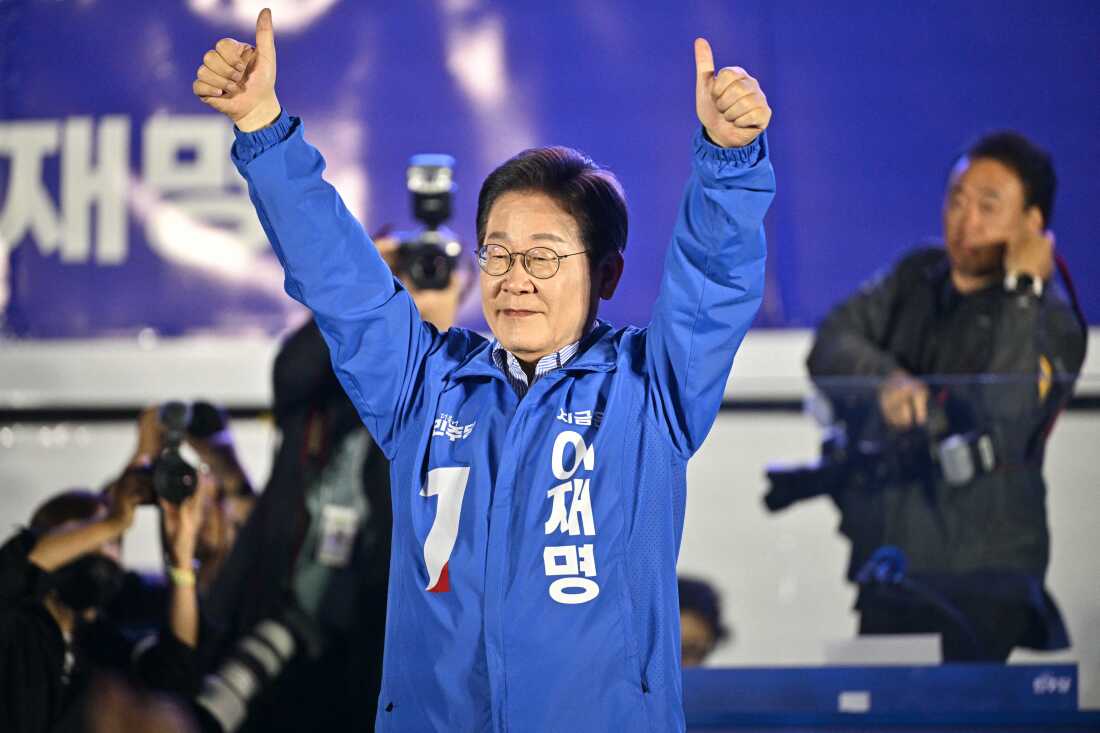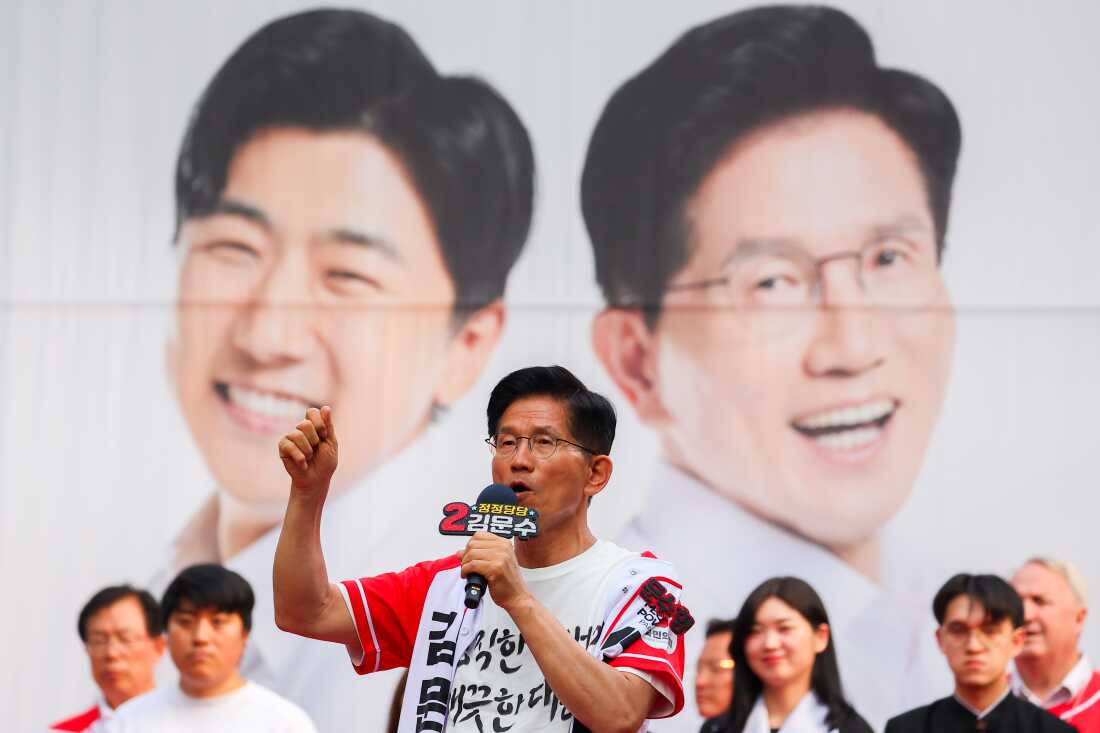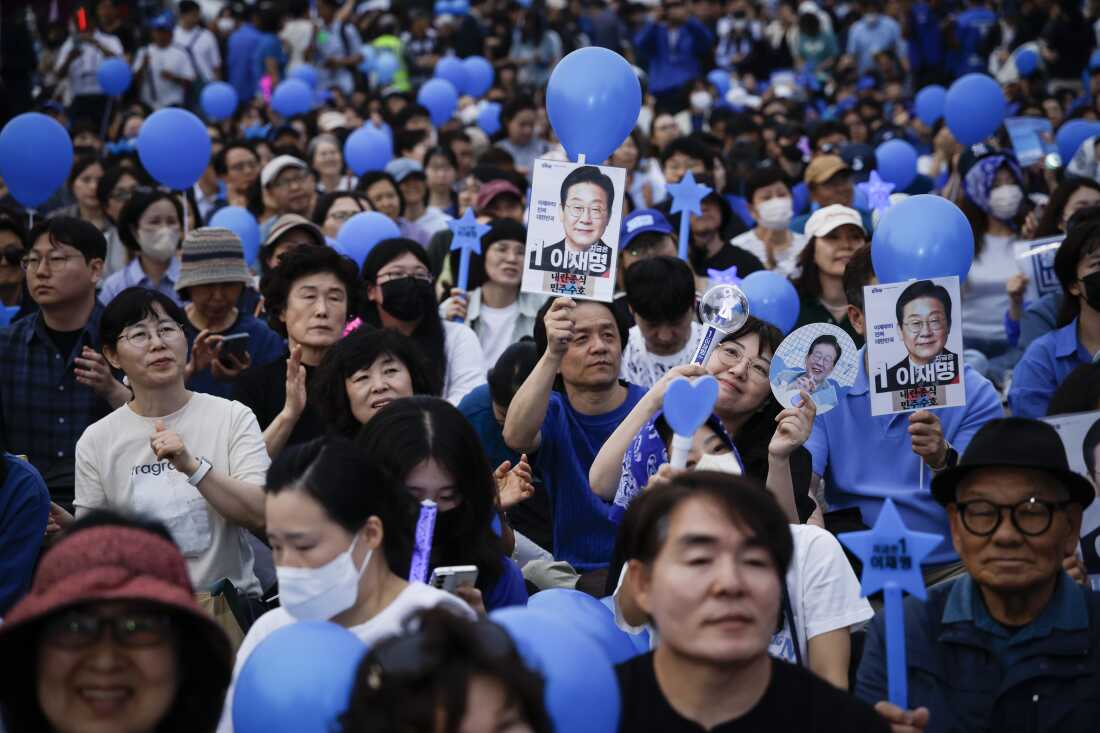
Election campaign banners for presidential candidates Lee Jae-myung of the Democratic Party of Korea and Kim Moon-soo of the People Power Party are seen on May 31 as the country’s presidential election nears, in Seoul, South Korea. Daniel Ceng/Anadolu via Getty Images hide caption
toggle caption
Daniel Ceng/Anadolu via Getty Images
SEOUL, South Korea — South Koreans are heading to the polls on Tuesday to pick a new president, in an election widely seen as a referendum on President Yoon Suk Yeol and the governing conservative party.
Polls will open across the country at 6 a.m. Tuesday morning (5 p.m. ET on Monday). Candidate Lee Jae-myung of the main opposition Democratic Party is expected to win. He has mostly kept a double-digit lead in polls over his conservative rival, Kim Moon-soo, throughout the race.
But whoever is elected, the new president will have little time for celebration.
World
Lessons from South Korea’s (and the U.S.’s) self-inflicted blows to democracy
SOUTH KOREA DEMOCRACY LESSONS
- Download
- Transcript
The election comes nearly two months after President Yoon was removed from office after his impeachment for declaring martial law in the country. The intense confrontation both in the South Korean Parliament and among the public over Yoon’s fateful act has aggravated the country’s political polarization and shaken South Koreans’ confidence in their democracy.

Lee Jae-myung, the presidential candidate for South Korea’s Democratic Party, gestures onstage on Monday during his final election campaign event ahead of Tuesday’s presidential election in Seoul. Anthony Wallace/AFP via Getty Images hide caption
toggle caption
Anthony Wallace/AFP via Getty Images
And during the leadership vacuum, tariff threats from the Trump administration have intensified, and North Korea has grown closer with Russia.
New president to face deeply polarized country
Both of the leading candidates from the two major parties have pledged to unite the nation.
But they each represent South Korea’s deepening division themselves.
Front-runner Lee Jae-myung has clashed with Yoon’s government as leader of the opposition, after closely losing to Yoon in the 2022 presidential election. Yoon vetoed a record number of bills passed by the opposition-controlled parliament, and Lee’s party impeached a series of government officials.
After Yoon declared martial law in December, Lee led his party in overturning it and eventually impeaching Yoon.
He has called this election “a decision between a return of insurrectionists and a rebirth into a new democratic republic.”
Asia
South Korea’s Yoon removed from office, but the country’s crisis is far from over
Yoon verdict
- Download
- Transcript
His rival Kim, who served as Yoon’s labor minister, has opposed the former president’s impeachment and resisted calls to cut ties with him.
In an emergency parliamentary session in December, when an opposition lawmaker demanded that Yoon’s Cabinet members apologize to the nation over the martial law declaration, Kim was the only one who refused to stand up and bow down.

Presidential candidate Kim Moon-Soo of the People Power Party speaks on Sunday during a campaign rally ahead of the presidential election, in Seoul, South Korea. Daniel Ceng/Anadolu via Getty Images hide caption
toggle caption
Daniel Ceng/Anadolu via Getty Images
Conservative voters’ support for Kim as their presidential candidate has since soared, even as his popularity among the general public in early polls lagged behind other aspiring conservative candidates who were more critical of Yoon.
“Emotional polarization” grips South Korean public, analysts say
“South Korean society became increasingly polarized through the three years of the Yoon administration and the five years of the previous administration,” Heo Jinjae, the research director of public opinion analysis at Gallup Korea, said at a recent news conference.

The Two-Way
From 2016: South Korean Lawmakers Vote Overwhelmingly To Impeach President
In 2016, South Korea impeached another conservative president over charges of corruption and bribery.
Nearly half of the governing party lawmakers voted to impeach President Park Geun-hye then. But this time, just over 10% did, “even as the reasons for Yoon Suk Yeol’s impeachment were much more serious than Park Geun-hye’s,” says Ha Shang Eung, a political scientist at Sogang University in Seoul.
The public was also less united this time. Around 80% of South Koreans supported Park’s impeachment, according to polls, but only around 60% wanted to impeach Yoon.
And the president’s supporters reacted more aggressively this time. In January, when a court issued an arrest warrant for Yoon, more than 100 of his supporters smashed the court’s windows and stormed inside.

Year of Global Elections
Elections reveal a growing gender divide across South Korea
Experts say South Korea’s polarization is more emotional than ideological.
“It’s not a matter of positions on an issue or a policy. People just hate the other side. It’s an emotional polarization. So it becomes a clash between us versus them, the good versus the bad,” says politics professor Yoo Sung-jin of Ewha Womans University in Seoul.
In a post-election survey by Gallup Korea in 2022, “resentment of the other candidate” was among the top reasons voters chose one of the two main candidates.
Yoo says political parties have increasingly relied on harsher rhetoric and extreme positions to appeal to more hard-line supporters.
On the campaign trail, the conservative candidate Kim has echoed the impeached president’s accusations of the opposition as “pro-communist,” saying he will “punish” them for “trying to turn this great democratic country into something worse than Hitler, Kim Jong Un, Stalin, and Xi Jinping’s country.”
Yoon’s staunch followers have also repeated his unfounded allegations of election fraud and judicial bias.
Meanwhile, South Koreans’ trust in democracy has declined.
In a recent survey by the Seoul-based think tank East Asia Institute, over 30% of people expressed doubts about election fairness. And among supporters of the governing party, 30% said dictatorship can be better than democracy.

Supporters of South Korean presidential candidate Lee Jae-myung of the Democratic Party wait for him to come for a campaign rally on Monday in Seoul, South Korea. Woohae Cho/Getty Images hide caption
toggle caption
Woohae Cho/Getty Images
Favorite faces questions over policies, earlier accusations
Since the presidential campaign began, the liberal candidate Lee has tried to woo more moderate voters, stressing pragmatism and national interest. He even said that his party is a “center-right party.”
He has also vowed to advance South Korea’s alliance with the United States and continue its trilateral cooperation with Japan, appearing to soothe conservative voters’ concerns about his foreign and security policy positions.
At the same time, he has distanced himself from a more progressive agenda, such as enacting an anti-discrimination bill and amending the rape law to include nonconsensual sex.

World
Long before this week, South Korea had a painful history with martial law
But if he is elected as expected, it remains to be seen whether his rightward policy shifts will help bridge the emotional gap with his fiercest critics.
In a recent poll, a majority of respondents said they find Lee “unlikeable.” The response was particularly strong among young men and older voters — groups that have supported the impeached president the most.
Lee also has unresolved questions about several court trials he is facing over charges of corruption and election law violations, which he has claimed are politically motivated.
And if elected, he would need to confront these challenges quickly. The president-elect of this snap election immediately assumes the position, with a simplified inauguration ceremony and no transition period.












